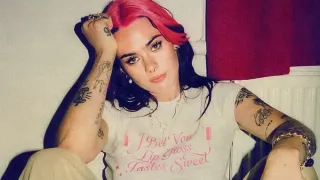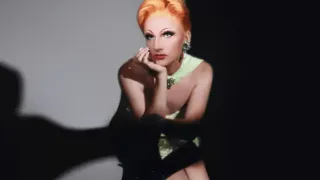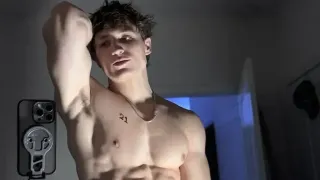March 21, 2024
In Queer Thriller 'Femme,' Co-stars Nathan Stewart-Jarrett & George MacKay Don Different Drag
Frank J. Avella READ TIME: 12 MIN.
In the exciting, boundary-shattering, queer neo-noir thriller "Femme," by first-time feature directors Sam H. Freeman and Ng Choon Ping, Jules (Nathan Stewart-Jarrett) enjoys his life as a drag performer until one night he suffers a homophobic attack that shakes him to his core. A bit later, he recognizes his attacker, the fiercely closeted Preston (George MacKay), at a gay sauna and decides to pursue him and exact his revenge. Preston does not recognize Jules out of drag, and the two embark on a complex, combustive relationship where power plays shift and identities are redefined.
"Femme" began life as a 2021 short film starring Paapa Essiedu and Harris Dickinson in roles somewhat similar to the ones that would eventually be smashingly embodied by Stewart-Jarrett and MacKay.
Both leads have had great success on stage, screen, and TV in quite a lot of queer-themed fare.
Stewart-Jarrett portrayed Belize in the National Theatre's production and Broadway transfer of Tony Kushner's "Angels in America," opposite Andrew Garfield, in 2017 and 2018. His early London stage credits include "The History Boys" (2007-08) and "Wig Out! (2008). His film work includes "Dom Hemingway" (2013), "Vita and Virginia" (2018), "Benjamin" (2018), and "Candyman" (2021), while on the small screen he recently starred as queer characters in HBO's "Generation" and "Culprits" on Disney+.
MacKay appeared in a number of Brit indie films before gaining international attention for his role in Matthew Warchus's gay-themed "Pride" in 2014. He made quite an impression in "Captain Fantastic," opposite Viggo Mortensen, in 2016. The actor's breakthrough role was the lead in Sam Mendes' BAFTA and Oscar-winning masterpiece "1917" in 2019. He's since appeared in "Wolf," "Munich – The Edge of War," and "I Came By," and will soon be seen in Bertrand Bonello's ambitious sci-fi epic "The Beast." His London stage credits include "Ah, Wilderness" and "The Caretaker." On TV he's been seen in "The Outcast" (2015), "11.22.63" (2016), and "The Trick" (2021).
EDGE had the pleasure of a zoom chat with the "Femme" stars about their bold new film.
EDGE: One of the things I really appreciated about the film was the complexities, the nuances of the characters. Usually in films like this, you have heroes and villains. That isn't the case here.
George MacKay: We've got Sam and Ping to thank for that. It is an incredible script that the story hinges on these characters and everything that they explore in the ambiguity of life and of these people... I think that that's what the film is about, the grayness within these polarized ends of the spectrum.
Nathan Stewart-Jarrett: Yeah, I think they present these two archetypes and then subvert them and, in that sense, pure good and evil [don't] really exist... We are both things. We are all things. And they really represented that in an amazing, tragic way.
EDGE: I wanted to discuss drag and identity. Drag as this form of expression, also repression. And these notions of masculine and feminine that I think the film fucks with.
Nathan Stewart-Jarrett: In a sense, we do both, at least Jules does both. The drag presentation – the performance in every aspect of our lives is a form of drag. And we see that in a very traditional sense with Jules at the beginning. It's an expression of himself and his world... and him feeling amazing as Aphrodite, which he then attempts to take out on the streets. And it doesn't really quite work out on the streets. Out of context, it's received differently. But also, I felt that when Jules goes to the sauna, Jules is still trying to reinforce something within himself... And then throughout the film other things happen, and Jules takes on a more masculine side of himself. I think that we all do it. When I was younger and I was really, really hung over, I used to only wear white. [He notices himself wearing white] Not hung over today! [Laughs] It was so I felt clean and good. I was rotting inside and felt awful, but it was about how I wanted to feel and how I wanted to be received. I think that the film really does explore that... And George, you've got loads of examples of the same thing.
George MacKay: Yeah. I think Preston is also entirely in drag, it's just a different type of dragging. It's, again, the subversions within the film. It's a masculine drag. And something that Nathan has articulated when we've talked about the film, which I didn't realize I've talked about it as if I came up with it, but what Nathan said a wee while ago that has rung so true is that [drag] is not just a costume that is separate, it's drawing something out that's in you already, and turning up the volume on it. And that was really something that was integral to understanding Preston's masculinity as well, that sort of more toxic, hyper-macho thing is inside of him. That is part of what is causing all of this contradiction, this tussling with himself. He's not just going, "I'll take that outside thing and put it on me." He's like, "I'm also that thing inside, and that's why I don't understand this part of myself, because those two things don't go together..." That's why he's such a wonderful character to play. He's become an extension of himself, and then has almost gone too far. He's in this cycle with himself. Just making sense of that was a joy.
Nathan Stewart-Jarrett: I remember Sam and Ping talking about the rules for some things. And Preston is stuck in this masculine world of rules. But Jules gets stuck in a queer world of rules... So, actually, both can be prisons. It's not that one is extremely positive, and one is really negative. They both can change.
EDGE: George, the neck tattoo...
George MacKay: It's funny, that was actually a real key into him... It was always specified that he had a neck tattoo. Preston is always identifiable by this neck tattoo with the yellow hoodie. There's this motif of the things that you can't untie from yourselves. And I thought it would be something like, this [makes tiny gesture] just under the ear, like a kind of footballer tattoo. And [hair and makeup designer] Marie [Deehan], the very first images she sent me were [makes giant full-neck gesture]... It really expanded my sense of [it]... This isn't a subtle thing. This is about drag. And with Buki [Ebiesuwa], our amazing costume designer, it was the same. Tracksuit. Hoodie. Bomber jacket. Keep it simple, keep it subtle. I'm trying not to draw attention. And then it became about [in our faces, loudly], 'I'm trying not to draw attention. Look at me, I'm not drawing attention.' That was so key... Those choices in makeup and costume really informed the character so much.
Nathan Stewart-Jarrett: George had the best costume rail you've ever seen! I walked in and they were like, "You're Jules, you're gonna play a drag queen." How is George's rail better than mine? I used to try and steal stuff from George's rail. "No, no, that's for George!" [George cracks up]






